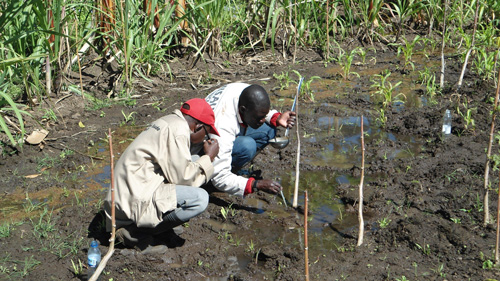 Malaria is considered the most important public health problem in Mozambique where it accounts for nearly one-third of all deaths and 42 percent of deaths in children less than five years old. Although malaria prevalence has decreased in all provinces, the country continues to face challenges that have slowed the progress of key malaria prevention and treatment interventions. PMI-supported activities include support for the national indoor residual spraying (IRS) program; free routine insecticide-treated Bed Net (ITN) distributions to pregnant women and to children; procurement and distribution of rapid diagnostic tests to all levels of the health system; provision of intermittent preventive treatment of pregnant women; and revitalization of the community health worker program.
Malaria is considered the most important public health problem in Mozambique where it accounts for nearly one-third of all deaths and 42 percent of deaths in children less than five years old. Although malaria prevalence has decreased in all provinces, the country continues to face challenges that have slowed the progress of key malaria prevention and treatment interventions. PMI-supported activities include support for the national indoor residual spraying (IRS) program; free routine insecticide-treated Bed Net (ITN) distributions to pregnant women and to children; procurement and distribution of rapid diagnostic tests to all levels of the health system; provision of intermittent preventive treatment of pregnant women; and revitalization of the community health worker program.
IRS continues to be a critical component of Mozambique’s National Malaria Control Strategy launched in December 2017 for 2017–through 2022. Through the support of PMI, Mozambique has implemented 14 rounds of IRS since 2007; these include six rounds under the AIRS Project (2011–2017) and three rounds under the PMI VectorLink project (2018–2019).
In year two (March 2019 – February 2020), Mozambique did IRS in five provinces: in Maputo, Gaza, and Inhambane provinces, implemented by Tchau Tchau Malaria and funded through a public-private partnership, MOSASWA; in Nampula province, implemented by the NMCP and funded by the Government of Mozambique; and in Zambezia province, implemented by VectorLink Mozambique and funded by PMI/ USAID. The Global Fund provided support to the Ministry of Health (MOH) to procure insecticide for all five provinces. PMI VectorLink Mozambique conducted IRS in five districts in Zambezia province, using both SumiShield® 50WG and Fludora® Fusion, from October 28 to December 14, 2019. The original target was 331,360 structures; in the end, 338,330 structures were sprayed out of 350,172 structures found by spray operators (SOPs), accounting for an IRS coverage rate of 96.6%.
In year three (March 2020 – February 2021), Mozambique implemented IRS activities in five provinces: in Maputo, Gaza, and Inhambane provinces, implemented by Tchau Tchau Malaria and funded through a public-private partnership, Mozambique, South African and Swaziland Initiative; in Nampula province, implemented by the NMCP and funded by the Government of Mozambique; and in Zambezia province, implemented by VectorLink Mozambique and funded by PMI/ USAID. The Global Fund provided support to the Ministry of Health (MOH) to procure insecticide for all five provinces. PMI VectorLink Mozambique conducted IRS in five districts in Zambezia province, using both SumiShield® 50WG and Fludora® Fusion, from October 28 to December November 30, 2020. The target was 350,172 structures; in the end, 361,820 structures were sprayed out of 373,094 structures found by spray operators (SOPs), for an IRS coverage rate of 97%.
In year four (March 2021 – February 2022), Mozambique implemented IRS activities in five provinces. In Maputo, Gaza, and Inhambane provinces, IRS was implemented by Tchau Tchau Malaria and funded through a public-private partnership, the Mozambique, South African and Swaziland Initiative. In Nampula Province, IRS was implemented by the NMCP and funded by the Government of Mozambique. In Zambezia Province, IRS was implemented by VectorLink Mozambique and funded by PMI/ USAID (Figure 1). The Global Fund provided support to the Ministry of Health (MOH) to procure insecticide for all five provinces. PMI VectorLink Mozambique conducted IRS in four districts in Zambezia Province, using Actellic 300CS (pirimiphos-methyl) in Milange, Molumbo, and Morrumbala districts from November 8 to December 11 and Ficam (Bendiocarb) in Mopeia District from November 22 to December 23. The target was 304,238 structures, in the end, 309,547 structures were sprayed out of 319,732 structures found by spray operators, for an IRS coverage rate of 96.8%.
In Year five (March 2022 – February 2023), VectorLink Mozambique will continue to work with the NMCP, the Zambezia Provincial Directorate of Health (PDH) and Provincial Health Services (SPS), the District Services for Health, Women and Social Welfare (SDSMAS) in each of the two target districts, the Ministry of Agriculture and Rural Development (MADER) and Ministry of Land and Environment (MITA) to spray 140,939 targeted structures using clothianidin /deltamethrin combination (Fludora Fusion) and bendiocarb 80WP-SB (Ficam). The project’s primary objective is to reach a minimum coverage of 85% of the structures found in each district by implementing high-quality IRS operations.
In addition to spraying, the VectorLink Mozambique will conduct the following activities:
- Support national and provincial governments in entomological monitoring in Cabo Delgado, Manica, Niassa, Sofala, Tete and Nampula and IRS capacity building in Nampula.
- Carry out a logistics assessment in all districts, and manage all international and local procurement, shipping, customs clearance, timely delivery, and storage of sprayer, spare parts and personal protective equipment (PPE).
- Ensure safe and correct insecticide application, thus minimizing human and environmental exposure to IRS insecticides.
- Continue to lead community mobilization, education, and communication (IEC) and social behavior change communication (SBCC) sensitization and mobilization activities to increase community awareness and acceptance of IRS.
- Conduct routine entomological monitoring in all PMI VectorLink supported spray sites.
- Complete the set-up of a replacement insectary in Zambezia.
- Continue with capacity strengthening of the PDH and SPS through weekly meetings to discuss all stages of IRS preparation and/implementation to equip them with capacity for the G2G implementation.
- Provide logistical support for training of trainers in Nampula Province.

